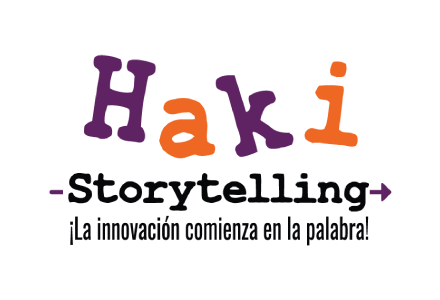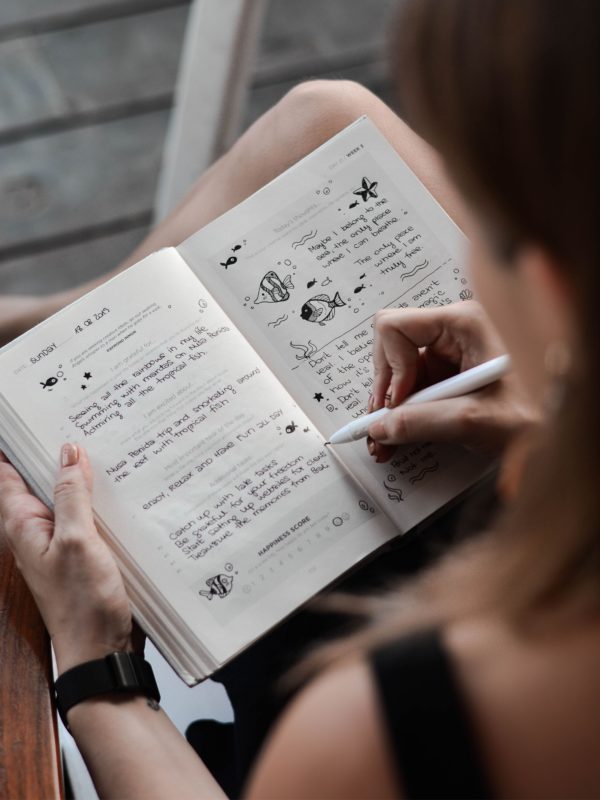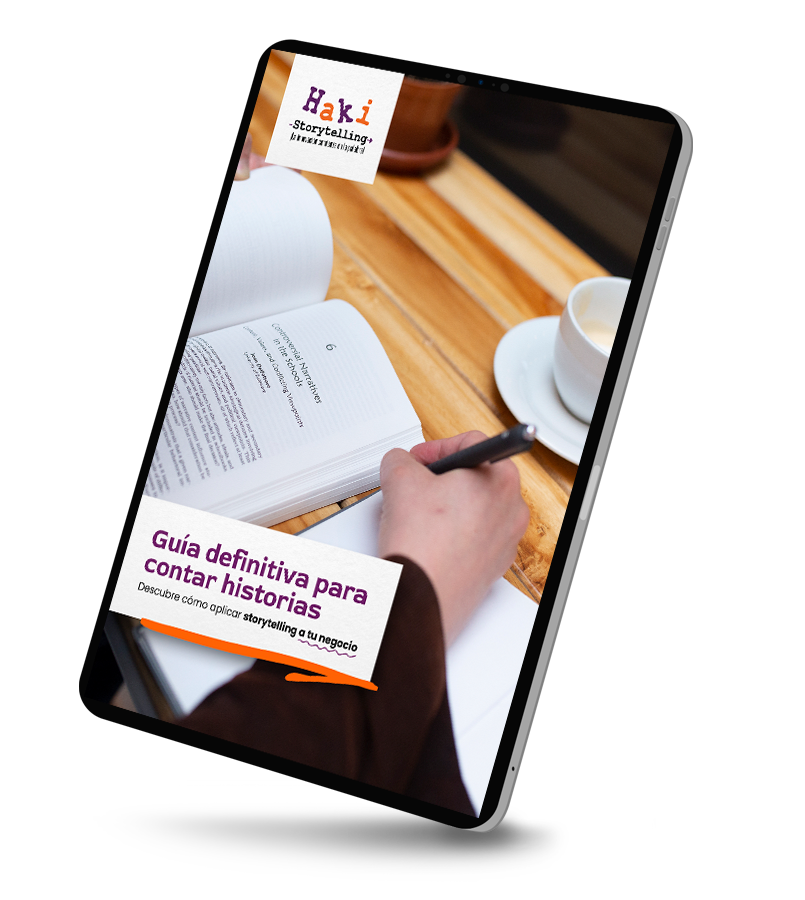Todo es una historia: Lo que sueñas, tu primera conversación del día con un compañero de trabajo, cuando alguien te cuenta un chisme, como planeas tu día, en cuestión de segundos, apenas te despiertas; una imagen que ves y te hace sentir algo, una frase que escuchas caminando por la calle, en fin, una lista de nunca acabar. Bien de lo dijo Muriel Rukeyser en su poema La velocidad de la oscuridad:
“El universo está hecho de historias, no de átomos”
Sabes que las historias están ahí, que permean todo lo que haces, pero te preguntas: “¿cómo las puedo obtener?, ¿cómo las destilo de mis experiencias diarias de vida? ¿Qué historias contar?”
Entonces te sumerges en la tarea de crear una, y decides aplicar toda la teoría narrativa posible: estudias cuáles van a ser los tres actos, diseñas un arco narrativo y un personaje en el que tu audiencia se va a ver reflejada, al tiempo que defines un conflicto que va a poner su vida patas arriba.
Cuando terminas, la lees y sientes que está forzada, que algo no anda bien. No te culpo, son pocas las personas que cuentan con un instinto narrativo natural y que todo lo que cuentan lo convierten en una historia memorable. Para la mayoría, crear una historia es un proceso que se debe llevar con cuidado si se quiere obtener un buen resultado.
¿Contar o escuchar?
Quizá, como te conto Cynthia Kurtz, experta en narrativas organizacionales, en su texto: Por qué el storytelling no es suficiente; el acto de contar no es nada sin el de escuchar, su contraparte.
Kurtz leyó cada libro, y artículo sobre cómo contar historias, pero siempre sintió que después de escribirlas les faltaba algo; una chispa, digamos, que no era capaz de darles. Estaba tan enfocada en descubrir Qué hace efectiva a una historia, que había pasado por alto las historias que le contaban las personas. Luego, con base en esa epifanía, construyo el método PNI (Participatory Narrative inquiry) y su carrera laboral.
La última pregunta que hago en este proyecto personal de escritura es la más importante, pues es en la que espero me cuenten una historia. He obtenido unas respuestas increíbles, con historias que quizá carecen de estructura narrativa, pero que me han emocionado un montón, y ya sabes que hacer sentir algo a alguien vale oro.
En cambio, en otras respuestas parece que las personas quieren salir del paso, y casi responden con un monosílabo. No los culpo, imagino que la pregunta les incomoda y sí no cuentan lo que yo espero, es porque le hace falta algo. Como dice la periodista Jacqui Banaszynski:
“Tu trabajo como entrevistador es convertir al
entrevistado en un contador de historias”
Las mejores historias son aquellas que nos cuentan los demás de forma natural, y logran establecer una comunicación sincera de doble vía. Aquí la pregunta que te puedes hacer es: “¿cómo logro que cualquier persona me cuente algo personal y emotivo cuando hablo con ella?”.
Preguntas con final abierto: un pasaporte al territorio de las historias.
Nazish Zafar de Shoopkeeper Stories, te contó en su escrito:¿Qué papel juegan las entrevistas en el storytelling?, que lo primero que debes hacer, al momento de realizar una entrevista, es sentir la energía de la persona y ver cómo te perciben, pues tienes una gran responsabilidad: convencerlos de que vale la pena que te dediquen un poco de su tiempo. Tú único objetivo, como dice Zafar, consiste en: “alentar a las personas que te den respuestas profundas y con textura, en vez de respuestas superficiales y genéricas.”
Por eso son importantes las preguntas con final abierto, pues estas permiten que las personas enfoquen sus respuestas hacia experiencias que, por lo general, vienen acompañadas de historias.
Así que recuerda, no te desgastes más de lo necesario intentando crear una historia desde cero; más bien preocúpate por diseñar preguntas que desaten ese contador de historias que tus clientes, proveedores, trabajadores o familiares llevan por dentro.
¿Y tú, cómo encuentras tus historias? Te espero en los comentarios.
PD: Envíame un mensaje si se te dificulta escribirlas; yo te puedo ayudar a narrarlas de una mejor manera.
…
TIPS FOR FINDING BUSINESS STORIES
Everything is a story: What you dream, your first conversation of the day with a work colleague, when someone gossips with you, how you plan your day, in a matter of seconds, just when you wake up; an image that you see and makes you feel something, a phrase you hear when you’re walking on the street, in short, a never ending list. Just as Muriel Rukeyser wrote in her poem The speed of darkness:
“The universe is made of stories, not of atoms.”
You know that stories are there, and the permeate everything you do, but you ask yourself: “How can I obtain them? How do I distil them from my daily life experiences? What stories should I tell?”
So you set on to the task of creating one, and you decide to apply all the possible narrative theory: you study which are going to be the three acts, design a narrative arc, and a character in which your audience will be reflected, while you define a conflict that would put his life upside down.
When you finish it, you read it and feels forced, that something is not right. I don’t blame you, few are the people who have a natural narrative instinct, and can convert everything they tell in memorable stories. For most people, creating a story is a process that must be carried out with care, to obtain a good result.
To tell or to hear?
Maybe, as Cynthia Kurtz, expert in organizational narratives, told you in her piece Why storytelling isn’t enough; the act of telling is nothing without hearing, its counterpart.
Kurtz read almost every book and article about how to tell stories, but after writing them, she always felt that there was something missing, let’s say a spark she wasn’t capable of imprinting in them. She was so focused in trying to decipher what makes a story efective that she had overlooked the stories that people told her. Then, based on that epiphany she developed the PNI (Participatory narrative inquiry) method, and built her professional career.
The last question I ask in this personal writing project is the most important, because I hope people tell me a story. I have obtained incredible answers; stories that may lack a narrative structure but have move me lot, and you know that making someone feel something is worth gold.
In other answers it seems that people want to pass by, and they almost answer with a monosyllable. I don’t blame them; I imagine that the question makes them uncomfortable, and if they don’t tell me the story I expect to hear is because something is missing. Like journalist Jacqui Banaszynski says:
“Your job as an interviewer is to turn the subject into a storyteller.”
The best stories are always those who others tell us naturally, and they manage to stablish a sincere two-way communication. Here the question you can ask yourself is: How do I get someone to tell me something personal and emotional when I speak with her/him?
Open ended questions: A Passport to the land of stories
Nazish Zafar from, Shoopkeeper Stories, told you in her piece: What role plays interviews in storytelling? That the first thing you should do when doing an interview, Is to feel the energy of the interviewee, and see how they perceive you, because you have a great responsibility: to convince them that it’s worth their time. Your only objective, as Zafar says, is to encourage textured and in-depth responses, rather than superficial and generic answers.
That’s why open ended questions are important, since they allow people to focus their answers toward experiences that, in general, come along with stories.
So remember, don’t wear yourself out, more than is necessary, trying to create a story from zero; instead worry about designing questions that unleash the storyteller that your clients, vendors, workers or relatives have within.
And you, how do you find your stories? Let me know it with a comment.
PS: Send me a message if you have trouble writing them; I can help you narrate them in a better way.






